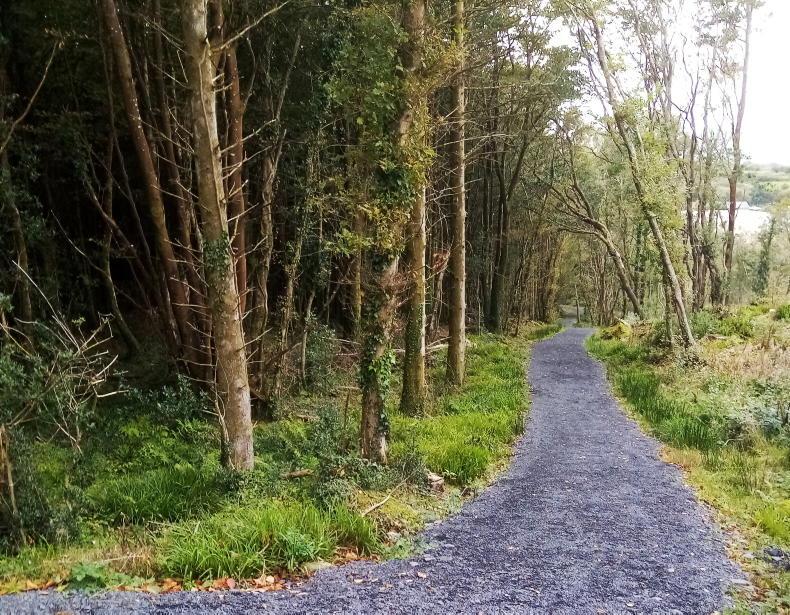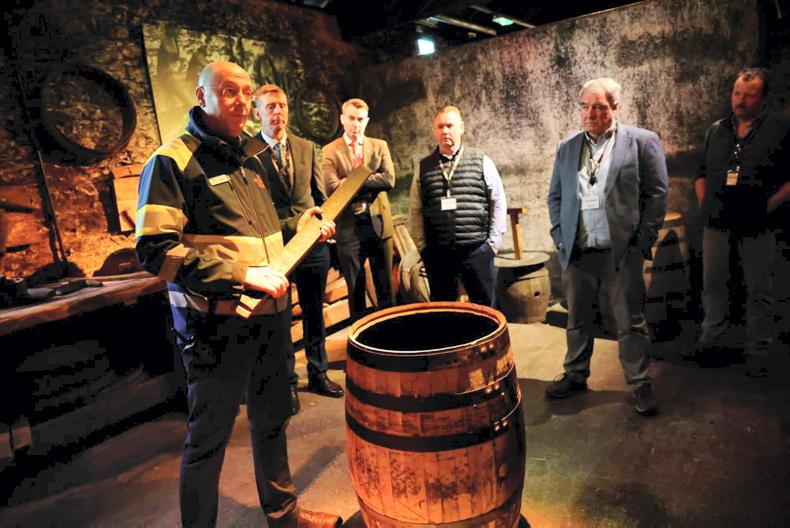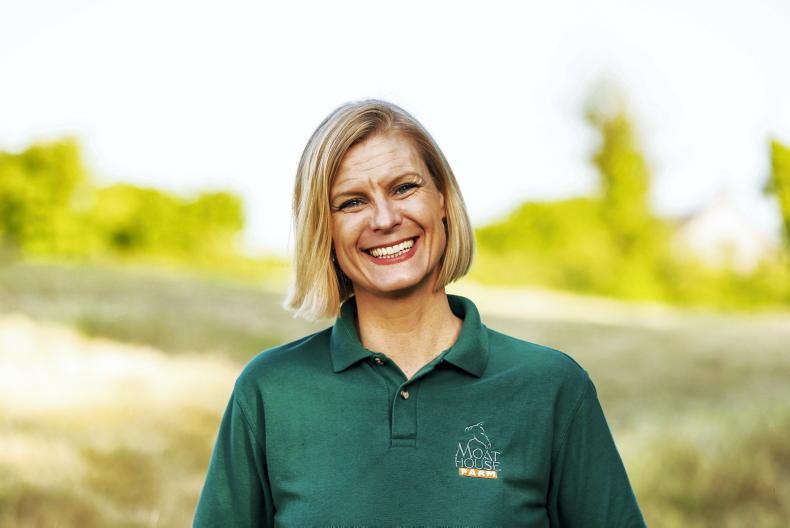The recent RDS forestry awards demonstrated that well-managed forests, regardless of age, species and area, can win this prestigious annual competition.
Sustainability, which was stressed by Minister of State, Pippa Hackett, in her address, was an important theme common to all winning projects. Perseverance and patience are also important, as Des and Elaine Drew demonstrated.
Their mixed-species forest in Julianstown, Co Meath won the coveted Production Forestry Award. “We received a merit award a few years ago, but our daughter Jane encouraged us to enter again and we are absolutely delighted to have won the award,” Des said.
Their 24ha forest contains “a diverse mix of conifers, including Sitka and Norway spruce, Douglas fir and hybrid larch, together will broadleaves – oak, sycamore, ash, alder and beech,” he explained.

Senator Pippa Hackett, Minister of State for the Department of Agriculture, Food and the Marine, presented the RDS Teagasc Farm Forestry Award to Sean Creamer, Ballinamore, Co Leitrim, flanked by John Dardis, RDS president (far left) and Dr Stan Lalor, Teagasc director of knowledge transfer.
Certification
When the couple decided to convert what was low production farmland into multifunctional forestry in 1999, they had little knowledge of forestry. They have learned fast.
For example, they have achieved forest certification – proof of sustainable forest management (SFM).
“Through self-education and utilising the Department’s funding supports, the Drews have gone on to lead a group of 12 farmer forestry owners to become the first certified forest owners group in 2018,” said Henry Phillips, chair of the RDS judging panel.
“The only way we could get the economies of scale to achieve certification was to merge with the Irish Forest Owners (IFO), which has woodland groups throughout the country,” Des said. “The IFO plan to expand this process so they can offer certification to other forest owner groups throughout the country.”
He maintained this is the best approach, as certification is “costly and requires between 40 and 50 members” to be feasible.
He is especially pleased with the performance of the hardwoods oak and beech in the forest. The only setback has been ash, which has suffered from dieback and will be removed.
Of the conifers, he wished he had “more Douglas fir, which is performing extremely well”, while hybrid larch – unlike European and Japanese larch – is “growing high and super straight”.
The woodland has been tended and thinned at regular intervals since 2010, reflecting contrasting yield classes and species. The couple make their forest available for IFO field days.
Leitrim winner
Sean Creamer, Ballinamore, Co Leitrim was the outright winner of the Teagasc Farm Forestry Award.
His initial motivation for planting arose from the need to address a significant drainage problem caused by work on the nearby Ballinamore-Ballyconnell canal. To combat this and diversify his income sources, he opted for forestry.
“The 9.4ha area that I planted – about 20% of the farm – was wet and heavy and would have been costly to drain,” he said. “I’m happy with my decision to plant, as it provides a better return than suckler beef production.”
He complimented Marina Conway, Victor Barber and the Western Forestry Co-op team, who carried out the planting. When asked about the response to his forest, he outlined two reasons why the forest is “admired” and viewed positively.
“There is greater acceptance of forestry when farmers plant their own land, instead of outside investors,” he said.
He also stressed the importance of blending forestry with the landscape, including the diversification of tree species. His forest includes oak, alder, mountain ash and Sitka spruce.
His species selection and continuous management impressed the judges – Henry Phillips, Jim Reidy and Mick Keane.
“Sean’s dedication to continuous forest management was clearly evident to us,” said Henry Phillips.
“His pruning of lower branches in certain areas not only enhances access for future thinning, but also allows the public to witness the rich diversification of species – flora and fauna – within the forest,” he added.
“Additionally, Sean has undertaken projects to safeguard water quality, such as installing pipes at crossing points to protect nearby ditches. Since the establishment of his forest, he has transformed struggling grazing land into a thriving and financially viable resource.”
Coillte community partnership
Knockranny Wood, Westport, Co Mayo, which won the RDS Community Woodlands Award, demonstrated the importance of partnership between a wide range of stakeholders in creating a major forest amenity. This project is a joint collaboration between Coillte – the woodland owners – Mayo Council, and the local community.
Knockranny, known locally as the ‘Colonel’s Wood’, covers an area of 27.5ha and was developed as a Neighbourwood Scheme, with part-funding from the Department of Agriculture, Food and the Marine (DAFM).
The project, completed in 2022, included a coniferous species replacement programme comprising 9ha of new native woodland. The area was underused by the local community for many years, but is now an important amenity thanks to signage, parking and the creation of walking trails.
“The work here is a fantastic example of a strong collaboration between the local community and Coillte,” said Dermot Tiernan, Coillte.
“Special thanks to Dick Bourke, the chairman of the Knockranny Residents Association, for his unwavering commitment and enthusiasm for this project, and for all the work he continues to do to enhance the facilities for everyone to enjoy in Westport,” he said.
The RDS awards are growing in stature, judging by the quality of the runners-up and merit award-winners.
Like the Drews’ woodland in Meath, these have the potential to be outright winners in the future.

The Drews' 24ha forest contains "a diverse mix of conifers, including Sitka and Norway spruce, Douglas fir and hybrid larch, together will broadleaves – oak, sycamore, ash, alder and beech".
This year, the category runners-up were Liam and Helen Bresnan, Caherconlish, Co Limerick (Production Forestry); Isabella Donnelly, Co Westmeath (Teagasc Forestry Award); and Knockanoura, 12 O’Clock Hills Recreational & Heritage Project (Community Award).
Merit awards were presented to Agnes Nolan, Co Limerick (Teagasc Farm Forestry) and Olive Leavy, Co Westmeath (Production Forestry). To avoid the need for future clearfelling, a number of RDS forest entrants have declared an interest in CCF.
Sean Creamer plans to introduce a CCF management system. Olive Leavy is already transforming some of her forest to continuous cover while the system is also being adopted by Coillte management in Knockranny.
The recent RDS forestry awards demonstrated that well-managed forests, regardless of age, species and area, can win this prestigious annual competition.
Sustainability, which was stressed by Minister of State, Pippa Hackett, in her address, was an important theme common to all winning projects. Perseverance and patience are also important, as Des and Elaine Drew demonstrated.
Their mixed-species forest in Julianstown, Co Meath won the coveted Production Forestry Award. “We received a merit award a few years ago, but our daughter Jane encouraged us to enter again and we are absolutely delighted to have won the award,” Des said.
Their 24ha forest contains “a diverse mix of conifers, including Sitka and Norway spruce, Douglas fir and hybrid larch, together will broadleaves – oak, sycamore, ash, alder and beech,” he explained.

Senator Pippa Hackett, Minister of State for the Department of Agriculture, Food and the Marine, presented the RDS Teagasc Farm Forestry Award to Sean Creamer, Ballinamore, Co Leitrim, flanked by John Dardis, RDS president (far left) and Dr Stan Lalor, Teagasc director of knowledge transfer.
Certification
When the couple decided to convert what was low production farmland into multifunctional forestry in 1999, they had little knowledge of forestry. They have learned fast.
For example, they have achieved forest certification – proof of sustainable forest management (SFM).
“Through self-education and utilising the Department’s funding supports, the Drews have gone on to lead a group of 12 farmer forestry owners to become the first certified forest owners group in 2018,” said Henry Phillips, chair of the RDS judging panel.
“The only way we could get the economies of scale to achieve certification was to merge with the Irish Forest Owners (IFO), which has woodland groups throughout the country,” Des said. “The IFO plan to expand this process so they can offer certification to other forest owner groups throughout the country.”
He maintained this is the best approach, as certification is “costly and requires between 40 and 50 members” to be feasible.
He is especially pleased with the performance of the hardwoods oak and beech in the forest. The only setback has been ash, which has suffered from dieback and will be removed.
Of the conifers, he wished he had “more Douglas fir, which is performing extremely well”, while hybrid larch – unlike European and Japanese larch – is “growing high and super straight”.
The woodland has been tended and thinned at regular intervals since 2010, reflecting contrasting yield classes and species. The couple make their forest available for IFO field days.
Leitrim winner
Sean Creamer, Ballinamore, Co Leitrim was the outright winner of the Teagasc Farm Forestry Award.
His initial motivation for planting arose from the need to address a significant drainage problem caused by work on the nearby Ballinamore-Ballyconnell canal. To combat this and diversify his income sources, he opted for forestry.
“The 9.4ha area that I planted – about 20% of the farm – was wet and heavy and would have been costly to drain,” he said. “I’m happy with my decision to plant, as it provides a better return than suckler beef production.”
He complimented Marina Conway, Victor Barber and the Western Forestry Co-op team, who carried out the planting. When asked about the response to his forest, he outlined two reasons why the forest is “admired” and viewed positively.
“There is greater acceptance of forestry when farmers plant their own land, instead of outside investors,” he said.
He also stressed the importance of blending forestry with the landscape, including the diversification of tree species. His forest includes oak, alder, mountain ash and Sitka spruce.
His species selection and continuous management impressed the judges – Henry Phillips, Jim Reidy and Mick Keane.
“Sean’s dedication to continuous forest management was clearly evident to us,” said Henry Phillips.
“His pruning of lower branches in certain areas not only enhances access for future thinning, but also allows the public to witness the rich diversification of species – flora and fauna – within the forest,” he added.
“Additionally, Sean has undertaken projects to safeguard water quality, such as installing pipes at crossing points to protect nearby ditches. Since the establishment of his forest, he has transformed struggling grazing land into a thriving and financially viable resource.”
Coillte community partnership
Knockranny Wood, Westport, Co Mayo, which won the RDS Community Woodlands Award, demonstrated the importance of partnership between a wide range of stakeholders in creating a major forest amenity. This project is a joint collaboration between Coillte – the woodland owners – Mayo Council, and the local community.
Knockranny, known locally as the ‘Colonel’s Wood’, covers an area of 27.5ha and was developed as a Neighbourwood Scheme, with part-funding from the Department of Agriculture, Food and the Marine (DAFM).
The project, completed in 2022, included a coniferous species replacement programme comprising 9ha of new native woodland. The area was underused by the local community for many years, but is now an important amenity thanks to signage, parking and the creation of walking trails.
“The work here is a fantastic example of a strong collaboration between the local community and Coillte,” said Dermot Tiernan, Coillte.
“Special thanks to Dick Bourke, the chairman of the Knockranny Residents Association, for his unwavering commitment and enthusiasm for this project, and for all the work he continues to do to enhance the facilities for everyone to enjoy in Westport,” he said.
The RDS awards are growing in stature, judging by the quality of the runners-up and merit award-winners.
Like the Drews’ woodland in Meath, these have the potential to be outright winners in the future.

The Drews' 24ha forest contains "a diverse mix of conifers, including Sitka and Norway spruce, Douglas fir and hybrid larch, together will broadleaves – oak, sycamore, ash, alder and beech".
This year, the category runners-up were Liam and Helen Bresnan, Caherconlish, Co Limerick (Production Forestry); Isabella Donnelly, Co Westmeath (Teagasc Forestry Award); and Knockanoura, 12 O’Clock Hills Recreational & Heritage Project (Community Award).
Merit awards were presented to Agnes Nolan, Co Limerick (Teagasc Farm Forestry) and Olive Leavy, Co Westmeath (Production Forestry). To avoid the need for future clearfelling, a number of RDS forest entrants have declared an interest in CCF.
Sean Creamer plans to introduce a CCF management system. Olive Leavy is already transforming some of her forest to continuous cover while the system is also being adopted by Coillte management in Knockranny.











SHARING OPTIONS